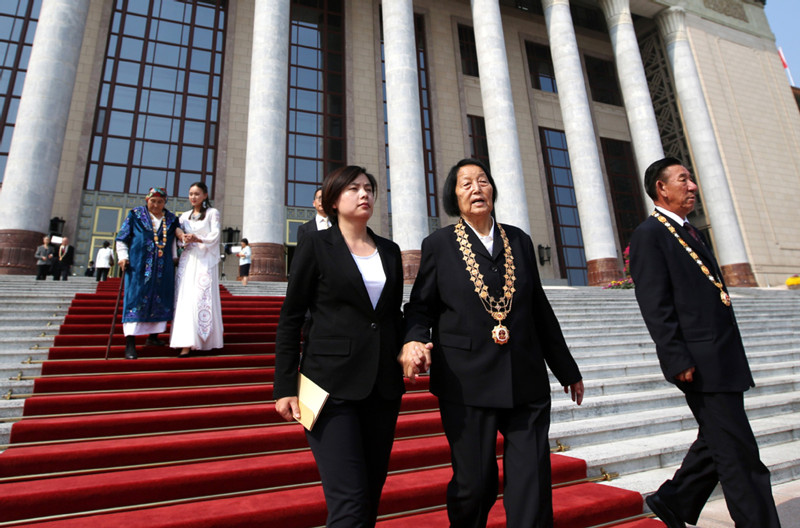A pioneer who flew the flag for gender equality

Shen Jilan (second from right) walks out of the Great Hall of the People in Beijing on Sept 29, 2019, after receiving the Medal of the Republic. CHINA DAILY
Late NPC deputy who kept humble was at forefront of nation's revival
Shen Jilan lived a remarkable life before she died last year at age 91. She was the only deputy to attend 13 consecutive sessions of the National People's Congress, the top legislature, since it was established in 1954; she was a pioneer who encouraged women in her hometown to work instead of staying at home; and her proposal on gender pay equality became a key part of the 1954 Constitution of the People's Republic of China.
Shen was referred to by many titles during her life, but she usually told people "I'm just a farmer".
She was born in 1929 in a remote village in the Taihang Mountains, a revolutionary base of the Communist Party of China in North China's Shanxi province. When Shen was 17, she married a soldier from Xigou village, Pingshun county.
It was a time when many women still followed the old custom of feet-binding and were asked to stay at home.
In 1951, the government of Xigou formed a cooperative to boost farming. Villagers struggled to make ends meet, and Li Shunda, head of the cooperative, turned to women to boost the labor force.
Shen was appointed deputy head of the cooperative and started to persuade women to join men in doing agricultural work. However, Shen soon encountered a hurdle-pay inequality.
"Men got 10 work points a day, but we only got a maximum of five points no matter how much work we did," Shen told Xinhua News Agency. The work points were a labor-based payment system during China's planned economy era.
Shen organized a contest to plant and fertilize seeds to prove that women can do the same, or more, work than men. The women won the contest as many of the men paused to smoke tobacco. After that, the women were given equal pay.
Media attention
Shen soon gained fame across the country through media coverage. In 1953, she attended the World Congress of Women in Copenhagen as a role model for women's liberation. The next year, she attended the NPC's first session, during which the Constitution was passed, establishing "equal pay for equal work" as she had proposed.
In 60-plus years serving as an NPC deputy, Shen made numerous proposals covering education, transportation, the conservation and development of water resources and many others, most of which were closely related to benefiting farmers.
Under proposals from Shen and many other deputies, numerous projects in Shanxi have been achieved, including utilizing water resources from the Yellow River for the province's irrigation and water consumption needs, the Taiyuan-Jiuguan Highway and the renovation of industrial bases.
Shen viewed the NPC as a platform where she could speak on behalf of the public.
In 1973, she was appointed the head of the provincial women's federation and moved to the capital, Taiyuan. However, she refused to relinquish her hukou, or household registration in Xigou, nor receive any salary, a house or other benefits for her new position.
"I can't leave Xigou or farm work. I'm just a farmer and my roots are in the countryside," Shen said.
Poverty work
After serving the provincial women's federation for 10 years, Shen returned to Xigou, where she was given another task-help fellow villagers get rid of poverty.
At that time, China was in transition from a planned economy to a market economy, under the reform and opening-up drive, which started in 1978. Shen proposed a mechanism to encourage co-development of collectively owned businesses and privately owned ones.
Shen opened the first collectively owned enterprise, a ferroalloy plant, in her village in 1985, and later built a walnut oil factory and a cannery.
These projects were followed by an alnico plant, beverage factory, and many other collectively owned enterprises, which became the pillars of Xigou's economic growth.
In 2013, Shen shut down the ferroalloy plant as it failed to meet the country's standards on environmental protection. Later, she proposed the closures of a number of companies that had high energy consumption, high levels of pollution and excessive emissions, and set up environmentally friendly businesses.
Under Shen's leadership, shiitake mushroom growing in greenhouses and photovoltaic power generation saw rapid development in Xigou. In 2019, overall income in Xigou reached 72 million yuan ($11 million), and per capita disposable income was 13,600 yuan which topped all villages in Pingshun county.
Last year, Shen died after battling a number of illnesses. Up until her final moment, she was still raising suggestions on poverty alleviation and improvements to rural infrastructure.
Over more than 60 years as an NPC deputy, Shen witnessed huge changes in China.
"I rode a donkey, later a truck, and then a train to Beijing for the 1954 meeting over four days. But today, it only took three hours by high-speed train," she told Xinhua.
Xigou has set up several memorial sites to commemorate Shen and her contribution to the village.
- Top legislature schedules standing committee session for late February
- China's top legislator meets with Uruguayan president
- Senior legislator surveys Anhui on formulating outline of provincial 15th Five-Year Plan
- China's top legislator meets with British PM
- NPC deputies see more engagement with top court



